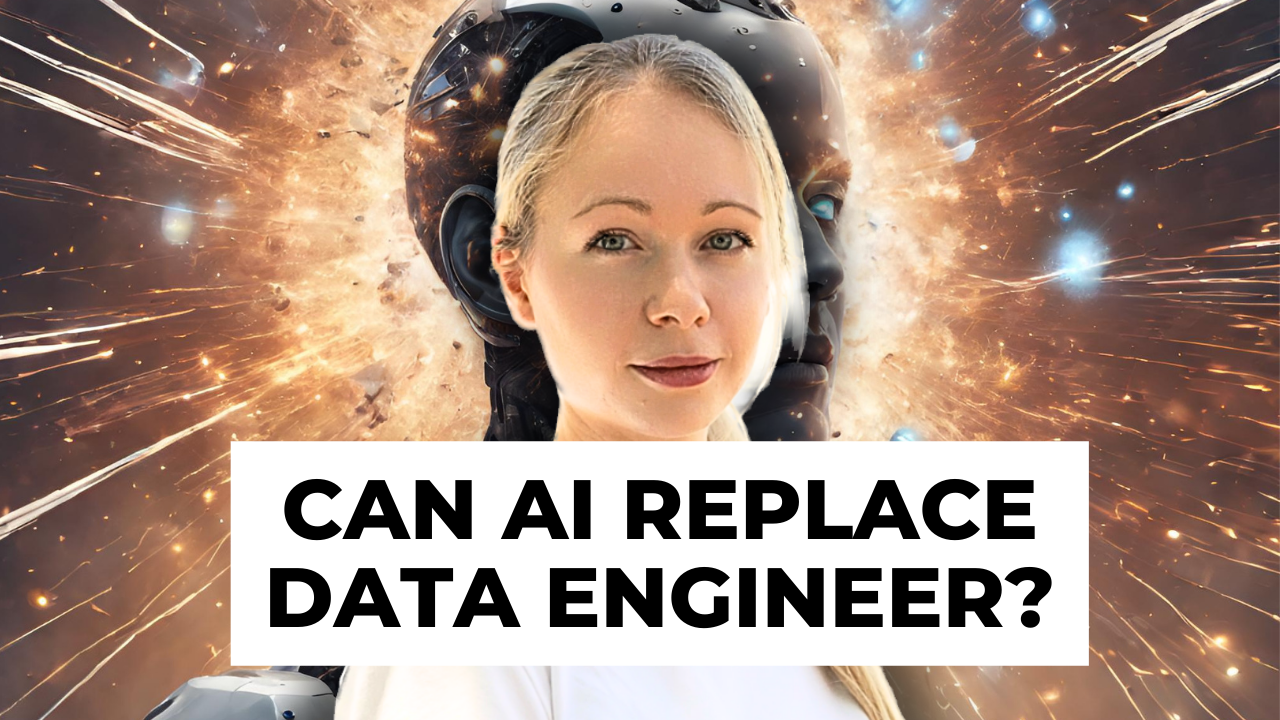Can AI replace Data Engineer?

While AI might taunt us with its abilities in these specific areas, it's crucial to remember that it's all in good fun. In reality, data engineers will still play a vital role in customizing solutions, ensuring data governance, and collaborating with teams.
AI is here to assist, not to steal the show!
Watch my episode here:
What AI Can’t do
[The Reality Check - Why AI Can't Replace Data Engineers Entirely]
🛠️ Complexity of Data Infrastructure: Data engineers are responsible for designing, building, and maintaining complex data pipelines and infrastructure. While AI can assist in some of these tasks, the design and management of such infrastructure often require a DEEP understanding of an organization's unique data needs, which is challenging for AI to replicate.
🔒 Data Governance and Security: Data engineers play a crucial role in ensuring data governance, quality, and security. They implement access controls, encryption, and auditing processes to protect sensitive data. AI can help with some aspects of data security, but human oversight and decision-making are essential to handle nuanced issues.
🔺 Data Architecture - Integration and Transformation: Data engineers are responsible for integrating data from various sources, transforming it into usable formats, and loading it into data warehouses or databases. While AI can automate parts of this process, data integration often requires domain-specific knowledge and manual intervention.
⚠️ Troubleshooting and Maintenance: Data pipelines and infrastructure can encounter various issues, such as data inconsistencies, pipeline failures, or hardware problems. Data engineers are needed to diagnose and resolve these issues, often through a combination of technical expertise and problem-solving skills.
️🗣 Collaboration and communication!: And let's not forget the human touch. Data engineers collaborate with data scientists, analysts, and business stakeholders to understand their needs and goals. AI might not be the best conversationalist when it comes to understanding the nuances of your organization's data challenges.
So, while AI may seem like it's ready to take over the world of data engineering, the reality is that it's more of a helping hand than a replacement. Think of it as your trusty sidekick in the data engineering adventure.
Low risk vs High risk DE tasks
So let’s summarise it. Here are low and high risk Data Engineering tasks:
HIGHER RISK
- Superficial Data Quality checks (Nulls, duplicates, formats, consistency, outliers etc.)
- Writing tests for pipelines
- Writing boilerplate code for pipelines (standard csv extraction, sending email, etc.)
- Dashboarding
- Writing data documentation
- SQL queries
- Answering typical business questions about data (The highest sold product, etc.)
LOWER RISK
- Domain-related data quality checks
- Data architecture
- DataOps tasks
- Data governance & security
- Data troubleshooting & maintenance
- Implementing Data best practices
How to be way ahead of the AI game?
Here is my personal opinion:
- 🍊🍎 HYBRIDS - Hybrid skill sets will be in demand: As data engineering becomes more intertwined with other fields like software engineering, data science, and business analysis, there will be a growing demand for data engineers with hybrid skill sets. MLOps and DataOps get more integrated into the DE stack
- Check latest AI SQL, coding generators like - I’m not quoting the name atm, because these tools are too fragile and perishable.
- Check Github copilot and latest advancements in code generators. It’s a big race of the best code llm, so let’s stay updated and check the most performant one
- Have a peek at topics like Distributed data storage and compute (ipfs, Bacalhau, etc.)
- Productionalising LLM’s: Challenges like handling massive amounts of data, large scale computation and memory, complex pipelines, transfer learning, extensive testing, monitoring, and so on. MLOps orchestration best practices, how to CI/CD of foundation models and transformers, along with the application logic, in production; how to manage and monitor the application pipelines, at scale
Conclusion
There you have it, my friends! The intimidation factor of AI in data engineering might be real, but remember, it's a partnership, not a takeover. AI and data engineers can work together to create a powerful synergy.
What do you think about the potential intimidation of AI in data engineering? Share your thoughts in the comments below, and let's keep the conversation going.
Until then, stay curious! 👋🤖💡
